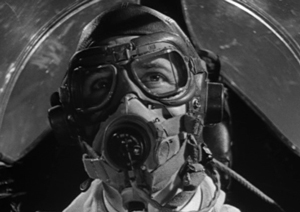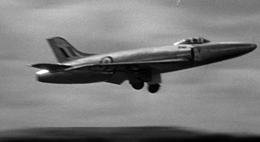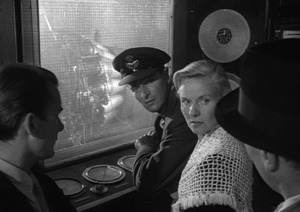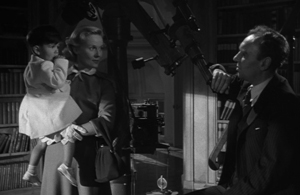
 |
|
|
|
Last May, Lionsgate released a three-disc, four-title DVD set in a metal tin, with the generic title The World War. The cover graphic sports a P40 Flying Tiger in the midst of a huge battle, an image that has nothing to do with any of the films in the set. Angels One Five is a standard flying film starring Jack Hawkins and The Captive Heart is an okay POW story with Michael Redgrave. But frankly speaking, neither is particularly memorable. Joseph Losey's King and Country doesn't live up to its reputation despite good performances by Tom Courtenay and Dirk Bogarde. A heartless court sentences a WW1 deserter to death, in a dull echo of Stanley Kubrick's anti-war Paths of Glory. 
The Sound Barrier is something else again. Known as Breaking the Sound Barrier in America (minus 9 minutes), David Lean's 1952 movie is several pictures in one. It's a rousing fanfare for postwar England, depicting the English aircraft industry poised on the cutting edge of jet technology and supersonic flight. It's a strange fantasy of denial, in which an American breakthrough is claimed for Great Britain. Thirdly, Lean's film is a prophetic science fiction story about a world transformed by aviation technology, with a progressive but rather harsh idea of where progress will lead us. Readers who remember Tom Wolfe's book The Right Stuff may recall the American test pilots' confusion over Breaking the Sound Barrier. The English were true jet pioneers. They were the first to come up with the concept of jet turbines and had some of the first jet aircraft flying. The English company BOAC started the first commercial jet service in 1952, the year of The Sound Barrier. But the movie not only pretends that an English pilot becomes the first aviator to fly faster than the speed of sound, it invents a completely false technical detail, that the flying controls of an aircraft reverse themselves when the speed of sound is approached. 
Terence Rattigan's original script turns the race to break the sound barrier into the obsession of the fictional John Ridgefield (Ralph Richardson), the owner of a large aircraft plant that he runs as a personal empire. John's son Christopher (Denholm Elliot, excellent in a brief role) dies learning to fly, trying to win his father's respect. Daughter Susan (Ann Todd) marries Tony Garthwaite (Nigel Patrick), an RAF flier who becomes Ridgefield's key test pilot. Pilots die when airframe vibration at the speed of sound causes them to lose control and crash. Susan shares Tony's love of flying but thinks it madness to risk lives in a race to be the first to fly Mach 1. Tony and especially John feel that the effort is all-important. Tony recruits Philip Peel (John Justin of The Thief of Bagdad), an old flying buddy and even better pilot. The exciting The Sound Barrier mixes unusual elements. Unlike the later British New Wave films, Lean and Rattigan's story celebrates the assumed superiority of the technocrat millionaire John Ridgefield. The tycoon pushes his experts and pilots to extremes. Aviation is everything, and only the worthy can become knights of the air. Son Christopher would rather kill himself than say "no" to his father, and neither Tony nor Susan can steer John away from his obsession with the sound barrier. As it turns out, Tony hasn't got all of the required "right stuff" either. He's not a college-trained engineer like Philip Peel. Tony has the courage but lacks the technical savvy, the extra talent that allows Philip to intuit his way through a seemingly insurmountable problem. 2 Nobody has the exact answer to why the sound barrier must be broken, but it's essential just the same. More concerned with the pursuit of an indefinable ideal, John Ridgefield risks leaving his daughter a widow. Ralph Richardson and Ann Todd had key roles in the science-fiction film Things to Come, made only fourteen years before. That film's quest for the stars remains the motivator of man's destiny, making "death and danger worthwhile". The new world requires a new breed of man. 
The story emphasizes that science-fiction miracles are happening now (1952). Tony is made curious by the scream of a jet engine coming from a secret research hangar, and he's enraptured when he finally confronts one on its test cradle. The men play eagerly with models of the sleek, propeller-less craft. But the film's poetry is reserved for a special sequence. Tony takes Susan on a casual one-day outing in a jet plane -- all the way to Cairo, Egypt. David Lean's visuals show their jet streaking high above European capitols, the Alps and the ruins of Greece. The careful compositions of the wordless sequence tell us that the world and its history are irrelevancies from the past, which can now be skipped over entirely. Tony and Susan lunch in Cairo and take a commercial jet flight right back to London. The globe has shrunk to nothingness. But the "new order of things" exacts a price. Tony's life is on the line on a daily basis. Both he and Susan are expected to sacrifice their happiness. Nobility has its obligations as well. The Peels move into the cottage Susan wanted, because she's a Ridgefield and father insists she live in the big house. Even though Tony knows he isn't the best man for the job, he can't disqualify himself from flying test runs because he has to hold up his end -- just like the forlorn Chris, his class position won't let him back down. Tony takes his jet into the sound barrier's deadly buffet zone, not really believing he can break it. 
The film's implications for the future are cold and unyielding. The world will be inherited by an elite new class composed of the best technicians and the finest specialists. Susan can only hope that her baby boy, playing on the floor of the Richfield observatory, will have what it takes to compete in the Great Quest of the future. Thematically, The Sound Barrier is a core science-fiction film; it also stubbornly clings to the notion that national pride and a noble class will lead England into a grand future. 1 Lionsgate's DVD of The Sound Barrier looks and sounds fine, with a clear B&W image that flatters Jack Hildyard's cinematography. Malcolm Arnold's stirring music score sounds great -- the movie won a 1953 Oscar for best sound. The Sound Barrier also earned Best Picture at England's BAFTA Awards. No other extras are provided, but at the disc set's low price, the three other features might be considered extras.
On a scale of Excellent, Good, Fair, and Poor, Footnotes:
1. Long before I saw The Sound Barrier, I read John Baxter's excellent Science Fiction in the Cinema (A.S. Barnes, NY, 1970), which first revealed the movie's essence as a work of science-fiction. 2. This review originally made an uninformed statement about the English class system, which I've rewritten after a Note from correspondent John Hodson, January 10, 2009: "Dear Glenn, just a couple of minor points about The Sound Barrier. David Brownlow, in his wonderful book on Lean, had Lean first considering the film in 1946 (though he admits he's unsure and a little puzzled by the chronology). Brownlow adds a little tale about Chuck Yeager watching the film in the U.S. and being a little twisted about the audience thinking "Uncle Sam" had let them down.... ....You say the story "celebrates the assumed superiority of the upper classes", but Richardson's thick Yorkshire accent clearly underlines the fact that Ridegfield is a scion of the working classes and a driven, self-made man -- Englishmen are, after all, betrayed the moment they open their mouths.
The film was restored last year by Studio Canal / The BFI / The David Lean Foundation and looks fantastic, better than the Lionsgate transfer. Those aerial shots filmed on infra-red stock (a la Archie Stout and 'Fort Apache') are superb. Thanks, John Hodson
Reviews on the Savant main site have additional credits information and are often updated and annotated with reader input and graphics. Also, don't forget the 2009 Savant Wish List. T'was Ever Thus.
Review Staff | About DVD Talk | Newsletter Subscribe | Join DVD Talk Forum |
| ||||||||||||||||||